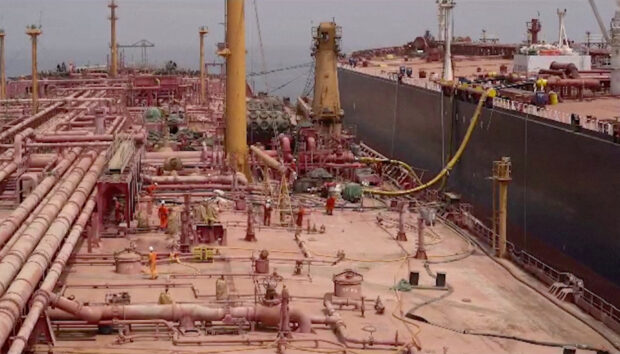UN finishes removing oil from decaying Yemen tanker

A view of a pipe laid between the decaying supertanker FSO Safer and its replacement oil tanker The Nautica off the coast of Ras Issa, Yemen, in this screengrab taken from a recent undated handout video. SAFER TECHNICAL COMMITTEE/Handout via REUTERS
Hodeida, Yemen — The United Nations said Friday it had successfully transferred more than one million barrels of oil from a dilapidated Yemeni tanker, removing the imminent risk of a spill.
UN Secretary General Antonio Guterres “welcomes the news that the ship-to-ship transfer of oil from the FSO Safer to the Yemen replacement vessel has been safely concluded today, avoiding what could have been a monumental environmental and humanitarian catastrophe,” a statement said.
The milestone means that “the core aspect” of a years-long effort to address the threat posed by the Safer, often referred to as a “ticking time bomb”, is now finished, said UN Development Programme head Achim Steiner.
“That removes the imminent and immediate threat that had become the focus of attention across the whole world: a tanker that could break apart or explode in the Red Sea,” Steiner told AFP.
Yet the Safer saga is not over.
Article continues after this advertisementThe UN has previously warned that even with its oil cargo removed, the vessel “will pose a residual environmental threat, holding viscous oil residue and remaining at risk of breaking apart.”
Article continues after this advertisementThe next phase of the project, stripping and cleaning the Safer’s tanks and preparing it for towing and scrapping, is expected to take “anywhere between two to three weeks”, Steiner said.
The Safer, a floating storage and offloading facility, has been moored around 50 kilometres (30 miles) from the Yemeni port of Hodeida since the 1980s.
It has not been serviced since war broke out more than eight years ago between Yemen’s Huthi rebels, who control the capital Sanaa and the waters where the Safer is positioned, and a Saudi-led coalition backing the internationally recognised government based in the southern port city of Aden.
The ageing vessel, with its corroding hull, was carrying 1.14 million barrels of Marib light crude, four times as much oil as was spilled in the 1989 Exxon Valdez disaster off Alaska.
‘Absence of accountability’
Now that oil has been pumped to a new, smaller tanker known as the Yemen that the UN purchased in March.
As the operation began on July 25, experts warned that success was far from certain given scorching summer temperatures, ageing pipes and naval mines lurking in surrounding waters.
The UN had even arranged for a plane to be on standby “within a 90-minute flight radius” so that it could “deploy chemicals from the air” in response to a spill, Steiner said.
All told, the UN has priced the operation at $143 million, a fraction of the estimated $20 billion clean-up costs that would have been incurred in the event of a spill.
Because of the Safer’s position in the Red Sea, a spill would have also cost billions of dollars per day in shipping disruptions through the Bab al-Mandab strait to the Suez Canal, while devastating ecosystems, coastal fishing communities and lifeline ports.
The UN is still roughly $20 million short, and on Friday Greenpeace said oil giants that previously used the Safer “and are the likely owners of some of the transferred oil” needed to contribute to the project’s next stages.
“It is imperative to address the absence of accountability exhibited by the oil industry that has recorded staggering profits, but hasn’t yet shown any sense of responsibility,” the group said in a statement.
Next steps unclear
With the oil now off the Safer and stored on the Yemen, officials are trying to sort out where it might go next.
The shipping firm Euronav will administer the Yemen on the UN’s behalf until the end of the year, but a long-term agreement between the country’s warring parties on “future maintenance and management” is needed, Steiner said.
One possibility is a follow-up project in which UN experts would train staff of the Yemeni oil and gas company SEPOC in “how to safeguard the vessel”, he said.
However authorities in Sanaa and Aden have appointed rival executive general managers of SEPOC, underscoring how Yemen’s conflict could continue to pose complications.
Hundreds of thousands of people have died in the fighting in Yemen or from indirect causes such as lack of food or water, in what the UN calls one of the world’s worst humanitarian crises.
Clashes between the Iran-backed Huthis and the Saudi-led coalition have reduced sharply since a UN-brokered truce began in April last year, even though it lapsed in October.